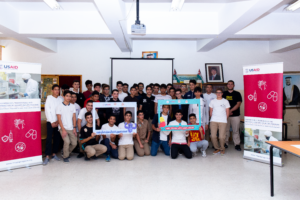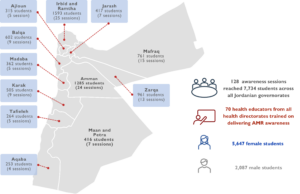Enhancing Antimicrobial Resistance Awareness: MTaPS Jordan’s Collaborative Effort to Educate Adolescents on Responsible Use of Antimicrobials
Addressing Antimicrobial Resistance through Education
Antimicrobial resistance (AMR) is a significant public health challenge exacerbated by lack of awareness and education among communities and health care providers. Common practices such as self-medication, stopping antibiotics prematurely, or sharing medications with other patients contribute to improper treatment and development of resistant microbes. In Jordan, where nearly 30% of the population is aged 10 to 24, it is crucial to focus tailored AMR education for adolescents. Misconceptions about antimicrobials among this group can be addressed with proper health education, ensuring that future adults make responsible choices and avoid unnecessary antibiotic use, ultimately reducing AMR’s impact on the community.
To help address these issues, MTaPS implemented the Communication and Awareness Intervention for School Students (CASS) on AMR in collaboration with the Ministry of Health (MOH), the School Health Directorate (SHD), and other relevant partners. This joint effort aims to promote a deeper understanding of AMR among school-aged students, fostering a culture of responsible antimicrobial use and paving the way for a healthier and more sustainable future in the communities. The practices and awareness cultivated today will continue to shape behavior and policy going forward.
Training School Health Department Heads and Health Promoters
In 2023 and 2024, MTaPS supported the MOH SHD in conducting training of trainers for all 24 school health department heads and health promoters nominated by the MOH who represent 14 MOH health affairs directorates on interactive AMR communication content and approaches, enhancing their capabilities in health education, effective communication of health messages, and training skills (figure 1). These trained individuals then capacitated all 70 health service providers nominated by the MOH who will be assigned to schools to deliver AMR awareness sessions to students. MTaPS provided essential tools for these health service providers to use during the sessions, including evaluation tools for teachers, knowledge assessment tools for students, and information, education, and communication materials for both teachers and students to ensure the awareness sessions are interactive and effectively convey AMR messages.

Dr. Asharf Aqel, Head of the Student Health Promotion Department, said: “The topics addressed in the training sessions are very important, and the CASS program was highly successful. It has been integrated into the national action plan for AMR 2023–2025 and is now a regular part of the school health awareness programs.”

Ms. Mais Karaki, School Health Head at Al Balqaa Health Directorate, added: “During the training sessions, we were equipped with the necessary skills and knowledge to effectively interact and communicate the dangers of AMR. By doing so, we hope to raise awareness among school students and encourage them to adopt responsible behaviors that can help combat this growing issue.”

Figure 1: School Health Education Unit Heads participate in the CASS training of trainers session on AMR awareness for school students,. February 18–-19, 2024, Amman, -Jordan. Photo credit: MTaPS Jordan
Wide-Ranging Impact of the AMR Awareness Sessions
In 2023 and 2024, the AMR awareness program reached 7,734 high school students (figure 1). A total of 1,690 posters and 12,700 pamphlets were distributed to schools countrywide that, along with the training sessions for health service providers, help promote better understanding of AMR and responsible antimicrobial use among youth and adolescents. The interactive AMR communication and awareness program activities were incorporated into the National Action Plan on AMR 2023–2025, ensuring sustainability and continued impact.
Figure 1 highlights the extensive coverage of the AMR awareness sessions conducted under the CASS program with the number of educational sessions held and the total number of students engaged in each governorate, showcasing the widespread impact of the initiative. By targeting young people, who make up a significant portion of the population in Jordan, the awareness program is effectively shaping the next generation’s understanding and behavior regarding responsible antimicrobial use with profound implications for the future of public health in the country.

Figure 2: Group photo of students from one of the public schools in Amman during the implementation of the CASS awareness session on AMR. Photo Credit: MTaPS Jordan.

Figure 3: Jordan map with the coverage of the AMR educational sessions across Jordan’s governorates, including the number of sessions and students and health educators trained.